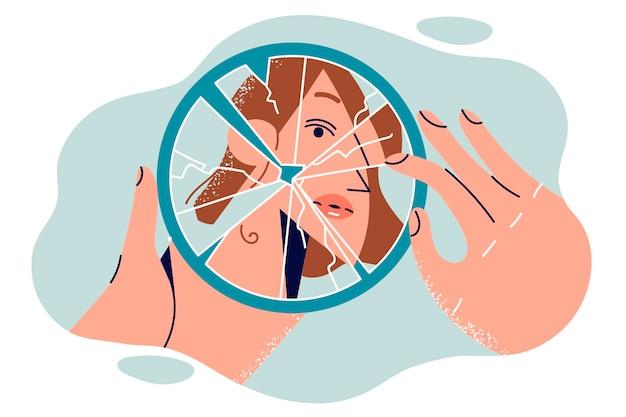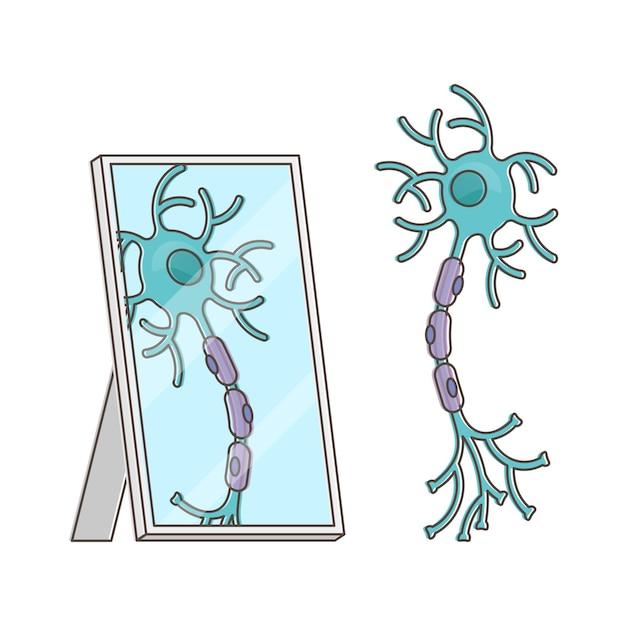Have you ever had a conversation where you felt like the other person truly understood you? Where they seemed to reflect your thoughts and emotions back to you in a way that made you feel seen and heard? This powerful communication technique is known as the mirror effect in psychology, and it can have a profound impact on how we connect with others.
In this blog post, we’ll delve into the mirror effect and explore its use in psychology. We’ll also discuss the difference between reflecting and paraphrasing, two skills that are essential for effective communication and active listening. Whether you’re a therapist looking to enhance your therapeutic skills or simply curious about how reflection works, this post will provide valuable insights into harnessing the mirror effect in various aspects of life.
So, if you’re ready to learn about the mirror effect, discover the essential skills needed for reflection, and find out how you can reflect your emotions, let’s dive in!

The Fascinating Mirror Effect: Unveiling the Psychology Behind It
Have you ever noticed how we tend to mimic the behavior and emotions of others around us? It’s like the universe is playing a sneaky game of copycat, and you’re stuck in the middle. Well, my friend, that phenomenon is known as the mirror effect in psychology. Let’s delve into this intriguing topic and uncover the secrets behind our tendency to mimic those around us.
Understanding the Mirror Effect
At its core, the mirror effect is the human inclination to imitate the actions, emotions, and even body language of people we interact with. It’s almost as if we reflect their behaviors like a mirror, hence the apt name. This phenomenon is deeply ingrained within us, and it influences how we establish connections and relationships with others.
The Power of Empathy
One of the primary drivers behind the mirror effect is our innate ability to empathize with others. As social creatures, we have this remarkable knack for putting ourselves in someone else’s shoes, mentally experiencing their emotions and thoughts. Imagine being able to walk a mile in someone’s Manolo Blahniks without breaking a sweat! Okay, maybe not the Manolo Blahniks, but you get the idea.
Our empathetic nature allows us to form deeper emotional connections and foster understanding. When we observe someone experiencing certain emotions, our mirror neurons fire up, prompting us to mirror their expressions and feelings. It’s like an invisible emotional dance that we subconsciously participate in.
Monkey See, Monkey Do
Remember how you used to mimic your older sibling’s every move as a child? Or the way you started saying “like” incessantly when you hung out with your teenager cousin? That’s the monkey-see-monkey-do nature of the mirror effect in action.
By imitating others, we adapt to social situations and foster a sense of belonging. It’s almost an unconscious effort to fit in and create harmony within our social circles. So, the next time you find yourself excessively using words like “dude” or “groovy” after hanging out with your hipster friends, blame it on the mirror effect. You’ll be off the hook!
Mirror Me: An Identity Puzzle
While the mirror effect plays a crucial role in fostering social bonds, it also poses a fascinating question: who are we, really? With our propensity to mimic and reflect the behaviors of others, we sometimes find ourselves wondering if our actions truly align with our authentic selves.
Think of it like this: are you a chameleon, effortlessly adapting to match the colors of your surroundings, or are you a solid pillar, unyielding to the influence of others? It’s like a never-ending tug-of-war between our desire for social acceptance and our need for self-expression.
Harnessing the Inner Mirror
Now that we’ve explored the captivating mirror effect, it’s time to harness its power to our advantage. By becoming more aware of our tendencies to mimic others, we can gain valuable insights into our own emotions and behaviors. So, the next time you catch yourself unconsciously mirroring someone, take a moment to reflect (pun intended) on why you’re doing it.
By understanding the mirror effect, we can enhance our emotional intelligence, nurture healthier relationships, and connect with others on a deeper level. Remember, the mirror effect is a fascinating force that shapes our social interactions, but we hold the power to shape it in return.
So, embrace your inner mirror, my friend, and let the world be your playful canvas. Just try not to get lost in someone else’s dance moves. They might not appreciate your attempts to steal the show!

FAQ: What is the Mirror Effect in Psychology?
What is the difference between reflecting and paraphrasing
Reflecting and paraphrasing are two different communication techniques used in psychology. While they may seem similar, there are subtle distinctions between them.
-
Reflection: This technique involves actively listening to someone and then restating or summarizing their thoughts and feelings in your own words. It helps individuals feel understood and validated. For example, if someone says, “I feel really anxious about the upcoming presentation,” you might reflect by saying, “It sounds like you’re feeling quite nervous about the presentation.”
-
Paraphrasing: On the other hand, paraphrasing involves rephrasing what someone has said without changing the meaning. It is often used to clarify or summarize information. For instance, if someone says, “I’m not sure if I can trust my friend anymore,” you might paraphrase by saying, “So, you’re questioning the trust you have in your friend right now.”
What is the mirror effect in psychology
The mirror effect in psychology refers to the tendency for individuals to subconsciously mimic the actions, behaviors, and emotions of others. It is a form of nonverbal communication that occurs during social interactions. Essentially, when we observe someone else’s behavior, our brain automatically activates the neural networks associated with that behavior, causing us to mimic it to some extent.
This effect plays a significant role in building rapport, empathy, and social bonding. It helps create a sense of connection and understanding between individuals. So, next time you catch yourself copying your friend’s body language or involuntarily mirroring their expressions, remember that it’s just your brain’s way of fostering social connection!
What skills are needed for reflection
Reflecting is not just a simple repetition of what someone has said; it requires specific skills to effectively communicate empathy and understanding. Here are some essential skills for reflection:
-
Active Listening: To reflect accurately, you must actively listen to the person speaking, paying attention to both their words and nonverbal cues. This means being fully present in the conversation and avoiding distractions.
-
Empathy: Reflecting involves putting yourself in the other person’s shoes and genuinely understanding their emotions. Cultivating empathy allows you to reflect back their feelings in a sensitive and compassionate manner.
-
Language Adaptability: Adapting your language to match the speaker’s style and level of understanding is crucial. Use words and phrases that resonate with them, making sure your reflection is easy for them to absorb.
-
Patience: Reflection can take time, especially if the person is communicating complex emotions or experiences. Be patient and give them the space to express themselves fully before crafting your response.
How can I reflect my emotions
Reflecting on your emotions is an essential self-care practice that can help you gain insight and improve emotional well-being. Here are a few steps to get started:
-
Recognize Your Emotions: Start by becoming aware of your emotions in different situations. Notice what you are feeling and label the emotions accurately. Practice mindfulness to tune into your emotions without judgment.
-
Validate Yourself: Once you identify your emotions, acknowledge and accept them as valid. Remember that all emotions, whether positive or negative, are normal and part of being human. Avoid self-judgment or suppressing your feelings.
-
Express and Reflect: Find healthy outlets to express your emotions, such as journaling, talking to a trusted friend, or engaging in creative activities. Reflect on your feelings by asking yourself questions like, “What triggered this emotion?” or “What can I learn from this experience?”
-
Seek Support: If reflecting on your emotions becomes overwhelming or you find it challenging to navigate certain feelings, consider seeking support from a therapist or counselor. They can provide guidance and help you develop effective reflection strategies.
Remember, reflecting on your emotions is an ongoing practice that takes time and patience. By embracing this process, you can develop a deeper understanding of yourself and enhance your emotional intelligence.
